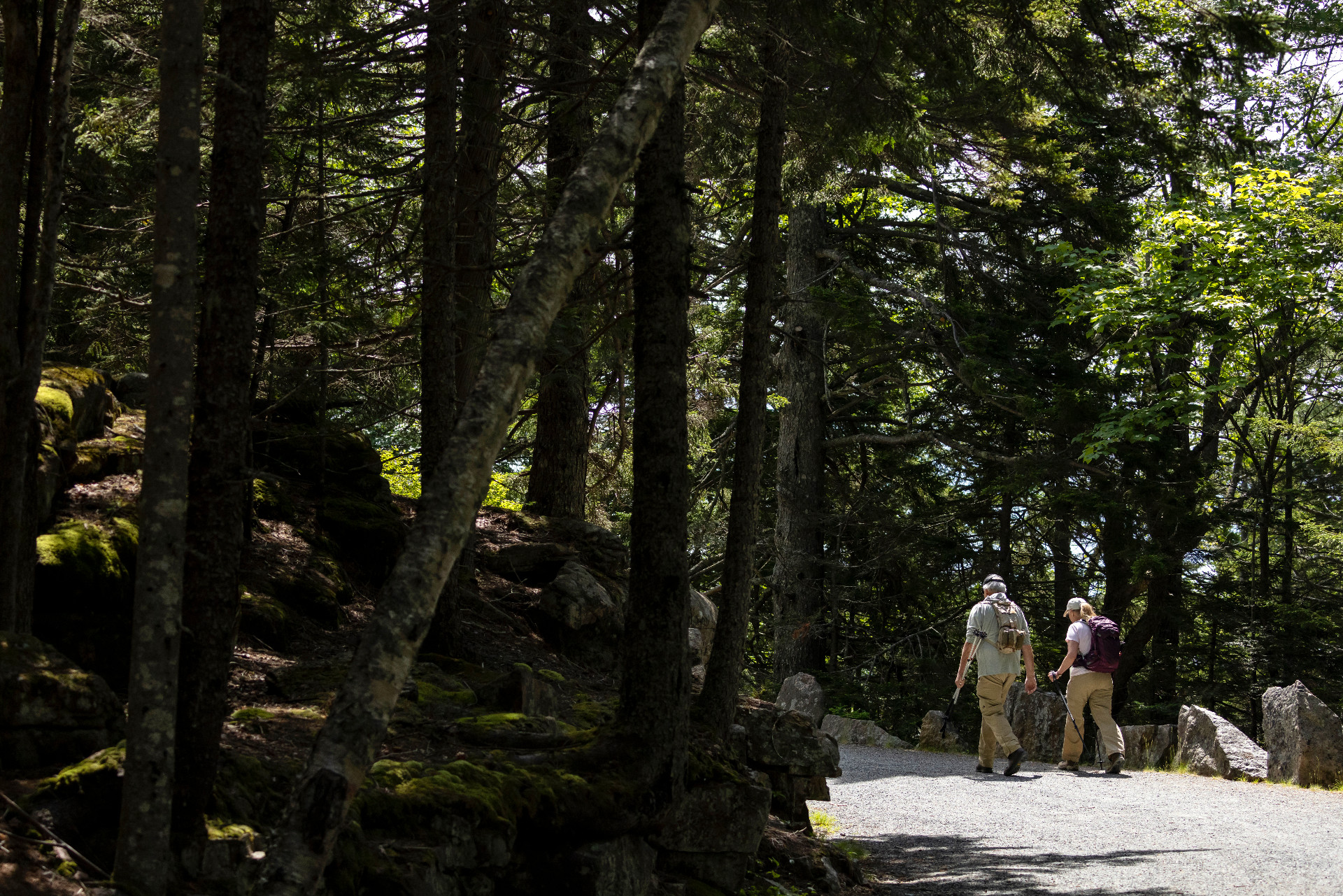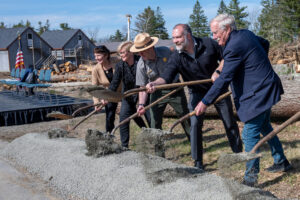
Visitors walk along the carriage road near the Parkman parking lot in Acadia National Park. (Photo by Ashley L. Conti/Friends of Acadia)
This op-ed from Friends of Acadia President and CEO Eric Stiles appeared in the Portland Press Herald on July 30, 2022.
Next Thursday marks the third anniversary of landmark bipartisan conservation legislation that provides much needed upkeep of critical facilities and infrastructure in our national parks, wildlife refuges, national forests and recreational areas – all of which generate billions of dollars in private sector economic activity.
The Great American Outdoors Act, passed by Congress in 2020, is the single largest investment in public lands in U.S. history. It directs up to $1.9 billion each year for five years into the National Parks and Public Land Legacy Restoration Fund to address the backlog of infrastructure repair and maintenance projects in our public lands, and it also invests in Bureau of Indian Education-funded schools.
Congress should remain proud of this historic investment in the protection and sustainment of our national parks and recreational areas. Now halfway through the five-year time frame for implementation, the Great American Outdoors Act has helped the National Park Service take care of significant infrastructure projects, including major repairs on the Blue Ridge Parkway, and replacement or upgrades to water and wastewater treatment systems at the Grand Canyon and Yellowstone, to name just a few.
Acadia National Park has also benefited from this funding. Since the investment kicked off, Acadia received more than $7.5 million in funding to rehabilitate water and wastewater systems at Schoodic Point and more than $26 million to replace the maintenance facility at park headquarters – a facility woefully inadequate as the hub for all carpentry, auto repair, welding, plumbing and electrical work in Acadia National Park, without mentioning the planning, design and oversight of all infrastructure projects. The existing maintenance building has a structural crack that runs its length and a single bathroom for 60 year-round and seasonal employees. Park maintenance teams determined it would be more costly to maintain the current structure than to replace it.
Acadia National Park’s needs don’t end there. Acadia maintains an estimated $1 billion of infrastructure: 214 buildings, 153 trail miles, 71 housing units, six campgrounds, 82 miles of unpaved roads (including the historic carriage roads), 17 water systems and 18 wastewater systems. That’s an enormous burden to maintain while being efficient and respectful of taxpayer dollars. Future Great American Outdoors Act projects could include rehabilitation of the former Navy housing at the Schoodic Education and Research Center, repairs or replacement of the Jordan Pond House facilities, and repairs to the Bass Harbor Light.
While infrastructure projects like these may not excite park visitors, they are critical to ensuring that both visitors and staff are safe and have an enjoyable experience when visiting our public lands.
Years of limited funding degraded the ability of the National Park Service to address park infrastructure. Friends of Acadia is grateful to Congress for both recognizing the need and acting with a significant investment in national park infrastructure in 2020.
My organization, Friends of Acadia, is happy to enhance this work through contributions from our endowments and donor-designated funds to preserve Acadia’s trails and carriage roads, maintain historic buildings and prepare for the effects of climate change. But it will take a continued and increased public-private partnership for years to come.
Please join us in celebrating the anniversary of the Great American Outdoors Act on Aug. 4. Entrance fees will be waived at Acadia National Park and all lands managed by the Department of the Interior. Also, be sure to thank the Maine congressional delegation for their part in passing this landmark legislation and share with them the importance of continuing these significant investments to make sure that Acadia and other national parks are maintained for future generations to enjoy.
 Join
Join Donate
Donate Acadia National Park
Acadia National Park


